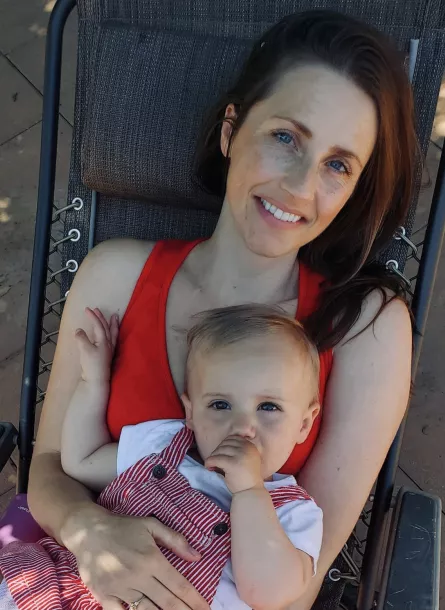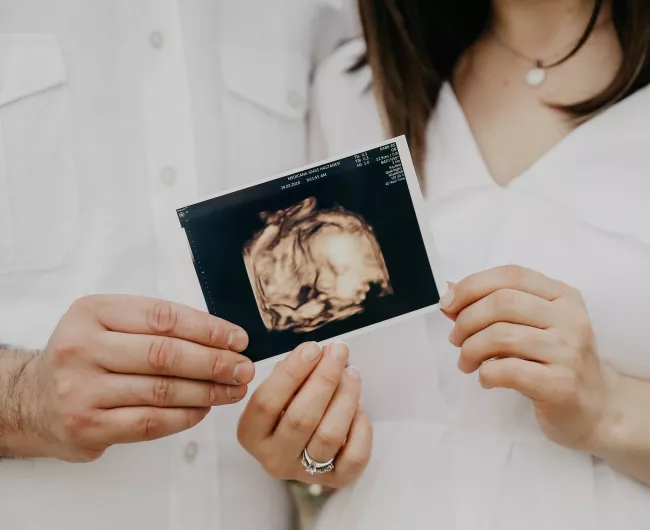
Fertility options for colorectal cancer patients
Treatment for colorectal cancer may include surgery, chemotherapy, and radiation. All three treatments can have major effects on fertility. Fortunately, patients have options.


Fertility preservation options for women and men
Colorectal cancer patients who wish to have biological children after treatment should inquire about fertility preservation before treatment begins.
Egg and embryo freezing
Egg freezing, or mature oocyte cryopreservation, is a technique that preserves a woman's ability to conceive in the future. Your eggs are carefully harvested from your ovaries, frozen without being fertilized, and safely stored for when you're ready to use them.
Ovarian transposition
Ovarian transposition is a surgical procedure that relocates your ovaries outside the radiation field. This crucial step minimizes the radiation exposure to your ovaries during radiation therapy, safeguarding your fertility.
Ovarian tissue freezing
Freezing ovarian tissue is a promising approach for preserving fertility for future treatments. A portion or the entire ovary is removed, and the tissue containing the eggs is sliced into thin sections and frozen. When the time is right, the tissue can be thawed and reimplanted into the woman's body, usually on the remaining ovary.
Ovarian suppression
Ovarian suppression refers to treatments designed to halt the ovaries from producing estrogen, either temporarily or permanently. This is essential in managing certain health conditions.
Sperm cryopreservation
Sperm cryopreservation involves freezing and storing sperm for future use. The sperm cells are meticulously frozen and stored, ensuring they are ready when needed.
Radiation shielding
Radiation shielding is a vital procedure to maintain a man's fertility by preventing harm to the testicles during radiation therapy. A protective shield is positioned over the scrotum (the external pouch that holds the testicles) during pelvic area radiation, providing an extra layer of safety.

Options for infertility
Every infertility journey is unique and influenced by individual diagnoses and financial situations. You may find yourself considering options like donor sperm, eggs, or embryos to build your family.
Sperm, egg, and embryo donations
Donating eggs or sperm enables one of the intended parents to maintain a genetic connection with the child. Egg donation allows the intended parent to establish a biological bond with the child through pregnancy. However, with embryo donation, there is no genetic link between the donors and the child.
Surrogacy
In a surrogacy pregnancy, eggs from the intended mother or an egg donor are fertilized with sperm from the intended father or a sperm donor to create an embryo. This embryo is then implanted into the surrogate mother's uterus, who carries the baby until birth.
International or domestic adoption
Adoption is a beautiful way to build a family. However, it may be necessary to postpone this journey until after completing cancer treatments.
Foster care
For those interested in adopting a foster child, the process typically begins by gathering information from a local foster care agency. Some localities have contracted the task of recruiting and approving adoptive homes to private agencies. However, you are not restricted to adopting from your local county agency and can apply to almost any foster care agency. Usually, there are no application fees, and both the home study and foster parent training are free of charge.
Living child-free
If you wanted to have children but can no longer, the emotional journey towards finding happiness in a life without them may involve a grieving process, as it signifies the loss of a dream. It is common to feel depressed, and often, the pain is misunderstood by others. Many incorrectly assume that people living child-free have chosen not to have children. It is important to identify and prioritize activities that nurture your maternal/paternal instincts. Allow yourself the space to grow and always seek support from a professional to help you through the process of living child-free.
Call the Helpline
Our Helpline is free and available to support you. Connect with certified patient and family support navigators who are ready to listen and assist you.
Top resources

Sex after colon cancer
Survivors may experience a range of intimacy issues depending on the type of treatment.





